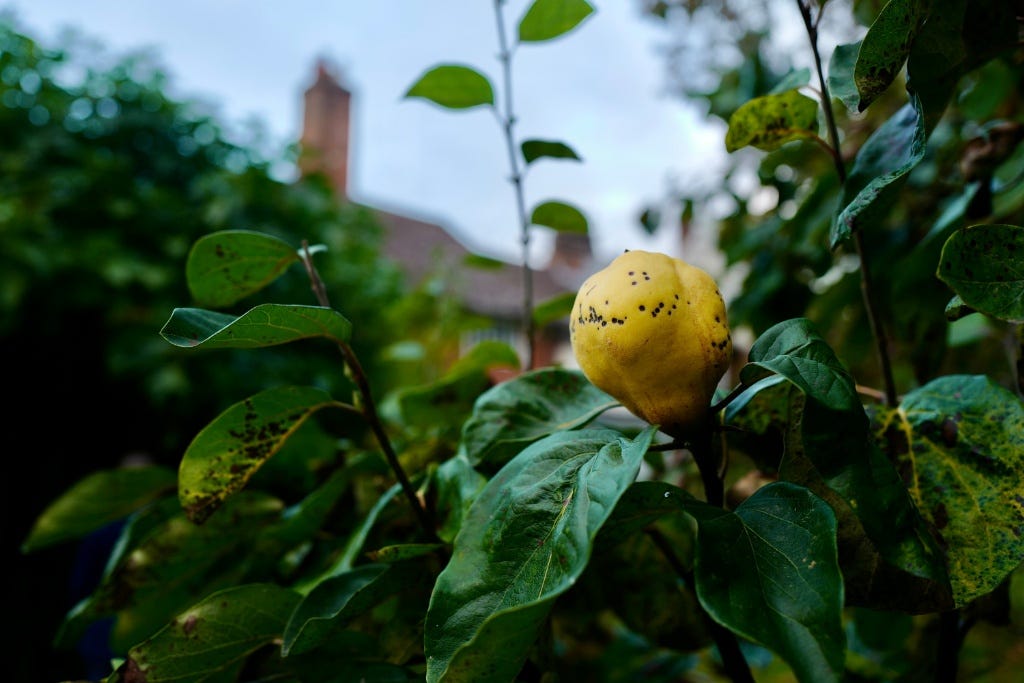The Quince tree
Quinces are fascinating fruits, always looking battered like sailors after a night on the town.
Quote of the Day
”That’s not exercise, it’s flagellation.”
Noël Coward on Squash
Musical alternative to the morning’s radio news
EELS | That Look You Give That Guy
Long Read of the Day
The climate disaster is here – this is what the future looks like
Stunning series of interactive visualisations by the Guardian. Not so much a long read as a long and sobering browse. Don’t know what it looks like in print, but it really works online.
Paddy Moloney and Frank Zappa
Stories about Paddy keep coming. Here’s a nice snatch of dialogue from the BBC Radio show Midweek presented by Libby Purves (Whom God Preserve) on which Frank and Paddy appeared.
Libby: I think we should break it to you that Frank has been known to sing ‘When Irish Eyes Are Smiling’.
Paddy: Really? I’m very sorry for your troubles, Frank.
Libby: We were going to invite him to do it with the Chieftains backing.
Paddy: Well, we’ll have a go. It’s early in the morning.
Frank: What we did with that particular song was that on St Patrick’s Day in 1988, we were working in a town in the US and we had an Irish population and an Italian population, so during the soundcheck in the afternoon, we put together an arrangement that combined ‘When Irish Eyes Are Smiling’ and the theme from ‘The Godfather’. (laughter)
Libby: The perfect combination…
Many thanks to Nibor for the tip.
Game-theory and diplomacy
Really interesting piece on how diplomats are beginning to appreciate how applied mathematics might be useful in international negotiations. It’s based on a conversation with Michael Ambühl, a professor of negotiation and conflict management at ETH Zurich and was the chief Swiss negotiator when Switzerland was negotiating the deal that it now has with the EU.
The Lab for Science in Diplomacy, a collaboration between ETH Zürich where Ambühl is based and the University of Geneva, will also focus on “negotiation engineering”, where existing mathematical techniques such as game theory are used either to help frame a discussion, or to play out different scenarios before engaging in talks.
I particularly enjoyed this bit:
Ambühl said that, as Switzerland’s chief EU negotiator, he ran a game theory simulation ahead of talks that led to Switzerland joining the Shengen area and a raft of agreements with the EU on tax, trade and security. The analysis indicated that it was in Switzerland’s interest for the negotiations to take place as a package rather than sequentially, and so the Swiss government insisted on this as a basis for talks.
Did the EU do their own analysis? “I don’t think so,” said Ambühl. “We didn’t tell them that we did game theory.”
Which of course makes one wonder if Michel Barnier had some backroom boffins working for him when he was ‘negotiating’ with the Brexiteering clowns.
On second thoughts, he didn’t need game theory, just re-runs of Laurel and Hardy.
My Commonplace booklet (Eh? See here)
We’ve had a cheeky little mouse in our utility room for about a week, and our elegant cat (who sleeps in the adjacent kitchen) was supremely indifferent to the presence of the little blighter, regarding him (or her) with the disdain of a Dowager Duchess contemplating a boot-boy.
But then the other night the mouse Went Too Far — climbing onto a worktop and nibbling away at the tiny, deliciously sweet, tomatoes that are still emerging from our green house. This was deemed by me to Too Much. Something Had To Be Done. (In capital letters.)
My wife (a compassionate and generous soul) fearing that I would do something drastic (like setting a violent mousetrap) then took preemptive action. She retrieved a non-lethal trap that we had once used successfully in the attic and on Sunday night set it up in the Utility Room, baited with a piece of cheese. Yesterday morning she came down early to find the little creature wandering round the (spacious) trap clearly wondering if there was more cheese where that from. Her captor then gently walked with the trap to the nearby wood and released him (or her) into the wild before returning to a cat — and a husband — demanding to know where was the bloody mouse.
All of which is a long-winded way of explaining that her humane approach to the matter reminded me of Robbie Burns’s lovely poem To a Mouse , addressed to a wee beastie whose nest had been disturbed by a plough in November 1785.
This is how it begins:
Wee, sleeket, cowran, tim’rous beastie,
O, what a panic’s in thy breastie!
Thou need na start awa sae hasty,
Wi’ bickerin brattle!
I wad be laith to rin an’ chase thee
Wi’ murd’ring pattle!I’m truly sorry Man’s dominion
Has broken Nature’s social union,
An’ justifies that ill opinion,
Which makes thee startle,
At me, thy poor, earth-born companion,
An’ fellow-mortal!
Read it from the link in its entirely and relish the immortal phrase that Burns gave to the English language (via his native Scots dialect)
But Mousie, thou art no thy-lane,
In proving foresight may be vain:
The best laid schemes o’ Mice an’ Men
Gang aft agley,
An’ lea’e us nought but grief an’ pain,
For promis’d joy!Still, thou art blest, compar’d wi’ me!
The present only toucheth thee:
But Och! I backward cast my e’e,
On prospects drear!
An’ forward tho’ I canna see,
I guess an’ fear!





‘Here comes that crazy sound again...’ https://m.youtube.com/watch?v=kcjbc22MKQI